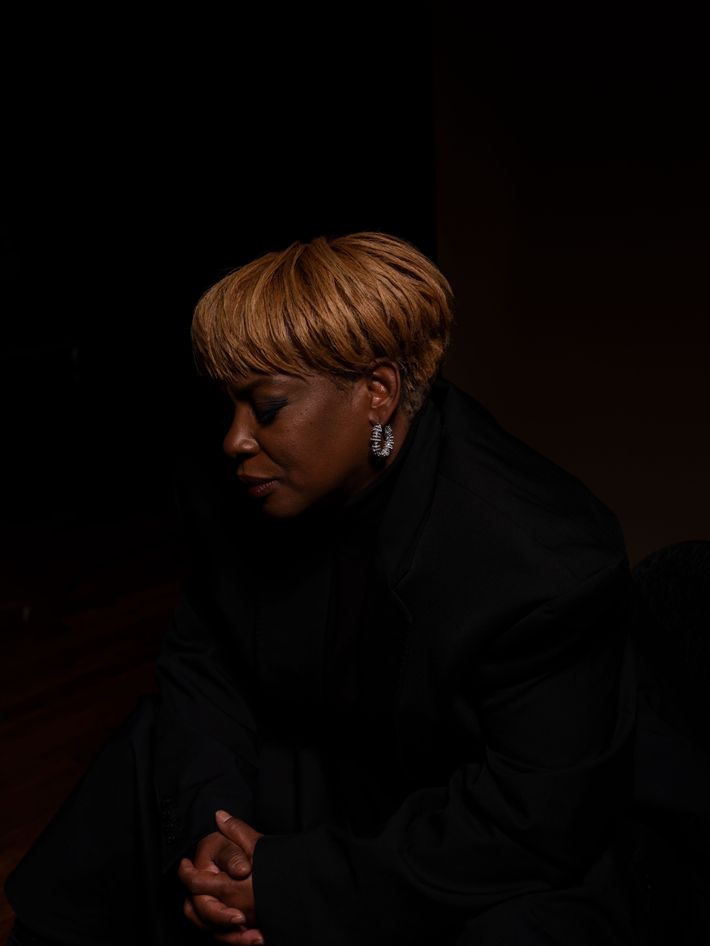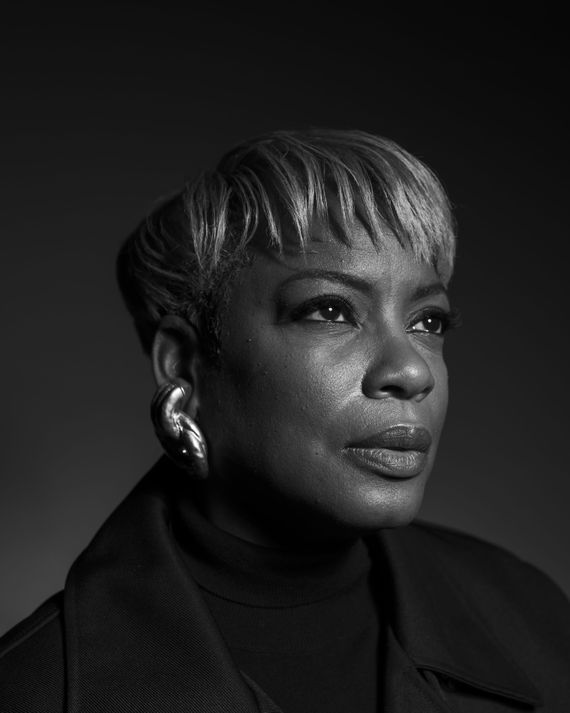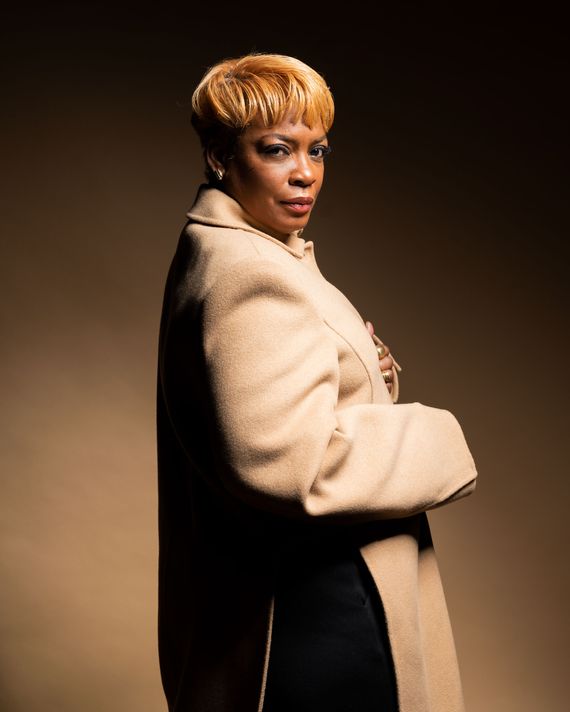
After the news of Nickel Boys’s two Oscar nominations (Best Picture and Best Adapted Screenplay), we’re revisiting this interview with Nickel Boys star Aunjanue Ellis-Taylor, which was originally published on January 10, 2025.
“You come here and see this view and you think, Yeah, this is my life,” says Aunjanue Ellis-Taylor. “Then you have to say, No, it’s not really.” For the average anxious person, overhearing such a statement could send you down a spiral about life, career, belonging. But Ellis-Taylor’s honey-warm voice obliterates any trace of nervousness buzzing about her Central Park hotel suite. Her eyes survey the hustle and bustle of city life below us, her golden-blonde tapered pixie and cozy-chic attire making her look very much like a New Yorker. Living here was once the Mississippi native’s goal: “I loved New York. I lived here for a while. I also had dreams of life here. But the older I get, I have to have some presence in the South,” she says. “Or the South has some presence in me.”
What Ellis-Taylor means is that she considers herself lucky. Her career, three decades in the making, didn’t start out with a bang. Often, artists like to say there was always a drive within them, something abstract that fed them whenever they got hungry for work. But while Ellis-Taylor had an interest in theater and transferred from Tougaloo College to Brown University, she never thought of it as a viable career. She worked three odd jobs to make ends meet. “I got fired from all of them,” she says with a laugh. “I knew there was something weird about me and that I lived in my imagination,” she says. “But how that would articulate itself, I didn’t know.”
She started acting professionally in 1995, playing Ariel, the fairy in The Tempest, at Broadway’s Broadhurst Theatre. The New York Times praised her performance as “deliciously sly.” But in the past five years, Ellis-Taylor’s rise as Hollywood’s secret weapon has been nothing short of inspiring. Whether she’s playing an Afrofuturist dreamer in Jim Crow–era Chicago (Lovecraft Country), Venus and Serena Williams’s fierce mother Oracene Price (King Richard), gospel-choir director Mattie Moss Clark (The Clark Sisters), mother to a troubled artist and lover to a recovering addict in Titus Kaphar’s Sundance hit Exhibiting Forgiveness, or, most recently, grandmother Hattie in Nickel Boys, critics and audiences are moved by Ellis-Taylor’s multitudinous depictions of Black women throughout different eras of American history onscreen. She imbues each performance with grit, seriousness, and warmth, and yes, she is an Academy Award, Golden Globe, and Emmy Award nominee, but the actor behind the acclaimed roles can be just as disarming as her characters.
Ellis-Taylor credits the Black women who surrounded her as a child with inspiring her thespian sensibilities, particularly with her latest performance as Hattie in Colson Whitehead’s acclaimed novel turned film adaptation, Nickel Boys. The story is set in 1962 Florida, where a young Black man named Elwood Curtis has a bright future ahead of him. One day, he hitches a ride to class with a slightly older Black man. The cops pull them over on the grounds that their vehicle has been stolen. As legal punishment, Curtis is sent to a segregated, all-boys reform school where sexual and physical abuse between the staff and the pupils is rampant. Hattie, Curtis’s grandmother, is the pillar of strength in this story.
Ellis-Taylor has admired RaMell Ross, the director of Nickel Boys, ever since she saw his 2018 documentary Hale County This Morning, This Evening, which centers on the lives of Black people living in the aforementioned Alabama county. “It was one of the first times I felt something that reflected my life as opposed to watching a perspective of someone who has a foreign observer point of view,” she remembers. She was so stunned by his work that she tracked Ross to Brown University, where he is an associate professor of visual art, and emailed him to talk about the documentary. She finally heard back from him in 2022. “Nickel Boys came around and they said that they were thinking about doing it, and there might be a role in it for me,” she says. Before she could even read the script, she knew she had to be in the film. The movie’s cinematography is unique in how it presents an alternating perspective between the eyes of Curtis and his confidant Turner, with Hattie showing up periodically to fight for her grandson’s freedom and to provide love and support in spite of the distance. “I trusted how he picked up a camera,” the actor says. “Nickel Boys is based off Whitehead’s book, but it’s also about what happens to American children. It gave me a chance to be a part of that.”
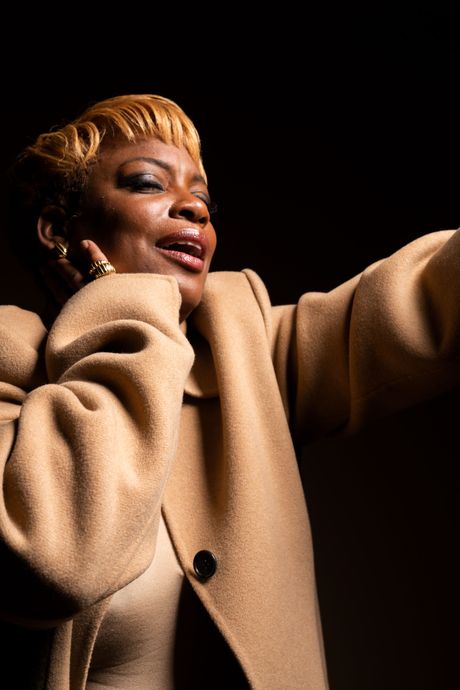
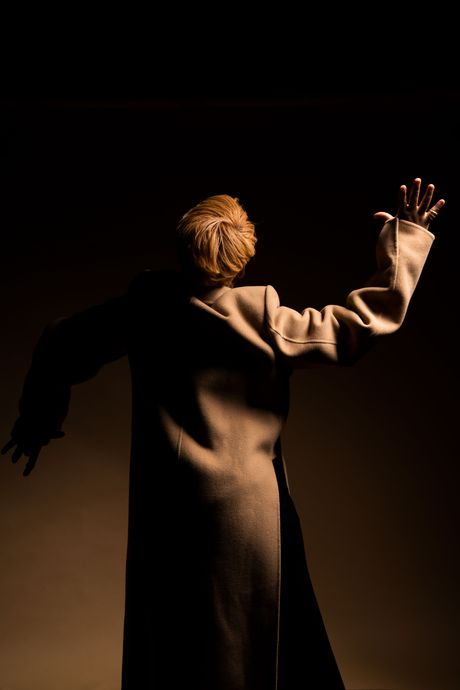
When Ellis-Taylor was born in 1969 in San Francisco, her mother had been grappling with sharp judgment from her religious community. The congregation of her Baptist church (where Ellis-Taylor’s grandfather was a pastor) did not approve of her mother’s pregnancy, which sparked from premarital sex. Her mother had to make a tough decision. “She couldn’t take care of me anymore,” the actor believes. Her grandmother, Myrtis Latricia Taylor, was a recent widow and took in 3-year-old Ellis-Taylor in Magnolia, Mississippi.
It was the 1970s, and growing up on a farm down South was not easy. They raised horses and chickens; her grandmother sometimes killed the latter for dinner with her bare hands. Acting was not a priority. The closest thing Ellis-Taylor could get to a conservatory was her attendance at church. On a Sunday morning, everything was a performance — from the fashion to the plays. “In retrospect, I understand,” she says. The church elders, she now realizes, “were trying to build children that would become adults that could be public-facing in a way that could save their lives.” As a child, attending church service four days a week was considered to be a conservative amount. Right now, in her own personal faith journey, she tells me she is at a crossroads. She brings up Sonya Massey, who called for Jesus in her final moments before a police officer killed her in her home. “Racism, police brutality, is still happening. Evil’s still winning, and I can’t sit in on one anymore,” she tells me of the church.
With Nickel Boys comes Ellis-Taylor’s most personal performance yet. In making the film, she felt there were many similarities between Hattie and her own grandmother. “Of course, she’s my physical DNA, but she’s also my emotional DNA. She’s my DNA of memories,” the actor says. Like Hattie, Myrtis was someone who took action. She was not physically affectionate, but she took care of Ellis-Taylor on a fixed income and stood on line to bring government cheese and peanut butter home. She was the kind of woman who would push a car out of a ditch to make sure Ellis-Taylor made it to a function to read a poem on time. To this day, thinking about the connections she drew between Hattie, who fights for Curtis’s release from the reform school, and Myrtis brings the actor to tears.
The realities of the presidential election, and the cultural and political targeting of minority groups like Black women and LGBTQ+ people, are fresh on our minds. “I’m still growing up in Mississippi,” the actor tells me through laughter. “I went home to vote a couple weeks ago and took pictures of the courthouse where they expunged my vote. They threw out my vote in 2020. They said, ‘Oh, it was some discrepancies,’ or something like that. Mind you, I voted absentee.” Borrowing a term from one of her dear friends, the late Chokwe Lumumba, she calls Mississippi a “petri dish” through which she believes we can learn a lot about how society functions. “I grew up around not just the ghosts of Jim Crow, apartheid, and genocide, but I lived amongst people who were the architects of that,” she says. “Their sons, daughters, and grandchildren — I went to school with them.”
Perhaps this is why she took the lead role as author Isabel Wilkerson in Ava DuVernay’s 2023 film Origin, in which she studies the structures of the caste system in the American South, Nazi Germany, and India. Her performance was praised by critics but not recognized with a nomination at the Golden Globes or Academy Awards. Ellis-Taylor even took it upon herself to promote it to audiences, handing out flyers for the movie in front of theaters in L.A. on the same day as the Globes. Online, fans of the actor and of the movie appreciated her guerilla-style marketing and celebrated her candor in interviews about the studio’s promotion of the film. “I didn’t see it as heavy lifting; it was something that I was happy to do. But I did feel like there was a bit of a void, you know what I mean?” Ellis-Taylor says now, a full year later. “Ava was doing a lot of things on her own. Self-generative. I feel like with the machine of Nickel Boys, that doesn’t have to happen because there are so many people involved … who are wanting it so passionately for it to be a success.”
As Ellis-Taylor encourages audiences to see Nickel Boys — and its director receives acclaim from the likes of the Gotham Awards and the New York Film Critics Circle — she’s also been exploring her other interests, such as the lives of Fannie Lou Hamer and Sister Rosetta Tharpe, two Black women whose contributions to activism and music, respectively, Ellis-Taylor feels have yet to be significantly acknowledged in the culture. In Atlanta, where Ellis-Taylor currently lives, she can often be found poring over books, newspaper clippings, and any other sources she can get her hands on to research at the Robert W. Woodruff Library in hopes that she can bring their stories to life. Archives are everything to her, especially in the aftermath of an election that brought up acute feelings of rage, an emotion she knows Black women are often shamed for experiencing, and an administration that threatens to erase the truth of America’s past. “People are afraid of us feeling this way,” she tells me. “But to not be means that you’re a little bit complicit because you’re saying that it’s okay.” Black stories, particularly those that address the legacies of slavery, may be scrutinized or outright banned across America in the near future. This possibility is frightening, but it has not stifled Ellis-Taylor. The actor welcomes the challenge, and working in her industry, she’s already exactly where she needs to be to effect change. Education, she says, “is not going to happen in the schools, but I’ve been saying that for a long time. We gotta repurpose cinema for that reason.”


